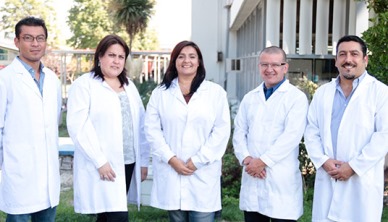- Universidad de Santiago’s interdisciplinary research team, led by Dr. Silvia Matiacevich from the Technological Faculty, is focused on developing an edible film that could increase the shelf life of fresh foods by 30%.
Improving the way of preserving foods has been a permanent concern in food industry. This is the reason why packaging is essential for the quality and shelf life of the product. But this packaging should be in harmony with the environment.
In light of this situation, a sustainable alternative for food packaging has been developed: food covering edible films, which are being widely used and have become a world trend nowadays. At Universidad de Santiago, an interdisciplinary research team is trying to replicate this development, giving value added to different national byproducts.
This initiative will be viable thanks to the Associative Dicyt Project called “Bioactive Coatings for Foods”, which gathers together experts from different faculties of the University.
“We will use food industry byproducts which are considered as dispensable or waste material. We are going to give them a value added by adding antioxidant and antimicrobial components to them in order to increase the shelf life of fresh food products,” Dr. Daniel López says.
Academics from three different faculties gathered for this purpose: Dr. Rubén Bustos, from the Faculty of Engineering (Department of Chemical Engineering); Dr. Diego Venegas and Dr. Marlén Gutiérrez, from the Faculty of Chemistry and Biology (Department of Materials Chemistry); and Dr. Daniel López and Dr. Silvia Matiacevich, from the Technological Faculty (Department of Food Science and Technology), being Dr. Matiacevich the leader of the project.
During the two years scheduled for the project, the researchers plan to study the synergistic effect of this combination of products and they expect to increase food shelf life by over 30%.
Interdisciplinarity
Most of the academics related to this project are part of a larger group created by the end of 2013 called Indi, Asociación de Investigadores por el Desarrollo e Interdisciplinariedad of Universidad de Santiago de Chile, a group of researchers that promotes development and interdisciplinarity at the university.
“All of us have participated in some of these initiatives at some point, seeking for this interdisciplinarity. This is how we have met other people and created contacts. What is good is that more than just admiring the work of others, we have the real possibility of conducting studies together. For this reason, we value this type of projects, as they promote the integration and interdisciplinarity that define a university,” Dr. Matiacevich says.
Translated by Marcela Contreras



